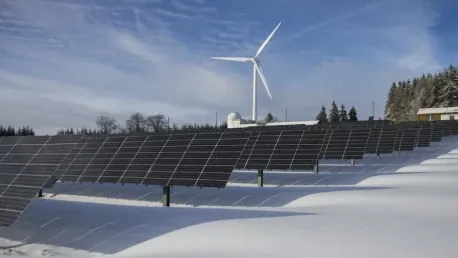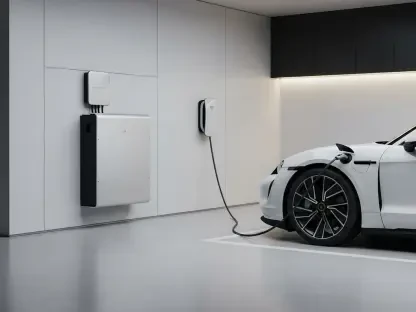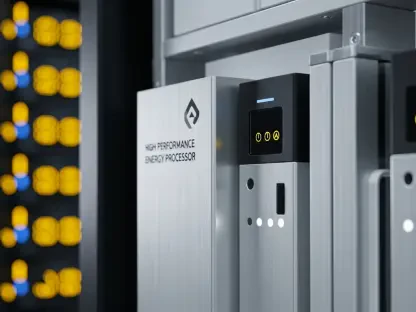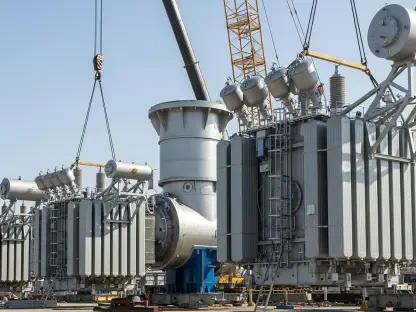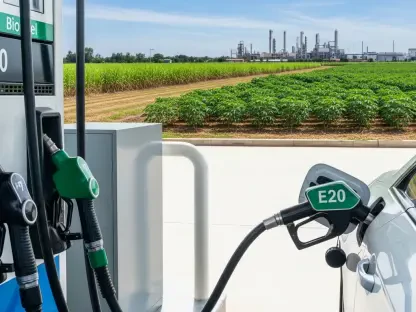FTC Solar, a prominent US tracker company, has recently signed two significant photovoltaic (PV) tracker supply agreements with renewables developers Dunlieh Energy and Sandhills Energy. These agreements mark a pivotal moment for utility-scale solar projects in Nebraska, significantly enhancing the state’s renewable energy infrastructure. As Nebraska takes notable steps towards a greener future, these partnerships illustrate a broader trend of increased investments in renewable energy infrastructure across the United States.
FTC Solar and Dunlieh Energy Partnership
1GW PV Tracker Supply Agreement
FTC Solar’s agreement with Dunlieh Energy involves a 1GW PV tracker supply deal set to commence in 2025. The initial project under this agreement is the 500MW Situla Energy Project, a solar-plus-storage development in Banner County, Nebraska. The delivery of solar trackers for Situla is scheduled to begin in the second half of 2025. This project is expected to provide substantial value to the local community, thanks to FTC Solar’s technology known for its quick, safe, and easy installation. As the project unfolds, the community of Banner County can anticipate numerous benefits arising from this significant renewable energy initiative.
Dunlieh Energy’s CEO, Thaer Flieh, emphasizes the importance of FTC Solar’s technology in ensuring the project’s success. The Situla Energy Project is poised to bring significant economic and environmental benefits to Banner County. The integration of solar-plus-storage solutions will enhance energy reliability and sustainability, contributing to the local economy through job creation and reduced energy costs. Additionally, the clean energy generated will play a crucial role in reducing the region’s carbon footprint and promoting environmental stewardship. The forward-thinking approach adopted here sets a precedent for future projects in the renewable energy sector.
Impact on Local Community
The impact on the local community of Banner County, Nebraska, from the 500MW Situla Energy Project, will be multifaceted. Economic gains will be significant, with the creation of jobs during both the construction and operational phases. Renewable energy projects of this scale typically generate employment opportunities in various sectors, from engineering and construction to maintenance and administration. Such an influx of employment can stimulate local economies, creating a ripple effect through increased spending and economic activity.
Moreover, the project is set to offer environmental advantages by significantly boosting the renewable energy output of the region. Reduced reliance on fossil fuels will result in lower greenhouse gas emissions and improved air quality. As renewable energy becomes more integrated into the local power grid, residents of Banner County can expect to see a reduction in their energy costs. This is particularly pertinent given the rising concerns over energy prices and sustainability. The local community stands to benefit holistically from this ambitious renewable energy project, which underscores the importance of sustainable development practices.
FTC Solar and Sandhills Energy Collaboration
Another 1GW Supply Deal
In addition to the Dunlieh Energy partnership, FTC Solar has secured another 1GW supply deal with Sandhills Energy. This contract targets utility-scale solar projects in Nebraska, encapsulating three different projects with capacities of 448MW, 320MW, and 225MW. Tracker deliveries for these projects are scheduled to commence in the third quarter of 2025 and continue through the fourth quarter of 2026. The systematic scheduling ensures a steady rollout of solar infrastructure, facilitating a smooth transition to greater solar energy utilization in Nebraska.
The strategic agreement with Sandhills Energy further solidifies FTC Solar’s position as a leading player in the renewable energy sector. By diversifying their project locations and capacities, both companies aim to optimize the distribution and impact of solar energy across different areas in Nebraska. This approach not only maximizes the efficiency of energy production but also ensures that the benefits of renewable energy are dispersed widely. As each project comes online, cumulative gains in solar energy capacity will contribute to a significant enhancement in the state’s overall energy portfolio.
Technological Excellence of FTC Solar’s Trackers
FTC Solar’s 1P Pioneer trackers, chosen for the Sandhills Energy projects, are highlighted for their design and efficiency. These trackers are known for their ability to maximize energy output while minimizing installation time and costs. They incorporate advanced tracking algorithms and robust structural designs that ensure optimal performance even under harsh environmental conditions. The efficiency of these trackers translates to higher energy yields per unit area, making them an attractive choice for large-scale solar developers.
The repeated selection of FTC Solar by significant developers underscores the company’s reputation for producing high-quality tracker technology that meets the rigorous demands of large-scale solar projects. By focusing on innovation and reliability, FTC Solar’s products offer a competitive edge that is crucial in the fast-evolving renewable energy market. Their trackers contribute to reducing the overall lifecycle cost of solar projects, thereby accelerating the adoption of solar technology. This technological superiority positions FTC Solar as a key enabler of the clean energy transition.
Nebraska’s Solar Energy Transformation
Burgeoning Solar Development
Nebraska has traditionally trailed in solar energy adoption, with only 203MW of installed solar capacity before these agreements. The combined capacities of the projects under the FTC Solar agreements with Dunlieh Energy and Sandhills Energy would increase the state’s PV capacity tenfold. This marks a transformative shift in Nebraska’s renewable energy landscape, positioning the state as a burgeoning hub for solar development. The dramatic increase in installed capacity will not only bolster the state’s renewable energy credentials but also inspire further investments in the sector.
The overwhelming response to these substantial projects highlights a growing recognition of the importance of sustainable energy solutions. As Nebraska pivots towards greater reliance on solar energy, it serves as a microcosm for the larger renewable energy movement sweeping across the United States. The state’s progress in solar energy development can act as a blueprint for other regions looking to amplify their renewable energy initiatives. This growing trend underscores the critical role of state-level actions in driving the national agenda on renewable energy.
Economic and Environmental Benefits
The successful completion of these projects is expected to enhance the economic and environmental benefits for local communities. Increased solar capacity will stimulate job creation, reduce carbon emissions, and provide more affordable and sustainable energy solutions. These developments align with broader trends in the renewable energy sector, driven by advancements in solar technology and supportive policies. Successful integration of these large-scale solar projects will underscore the practical and economic feasibility of sustainable energy systems.
As Nebraska enhances its renewable energy infrastructure, local economies will benefit from the influx of investment and job opportunities associated with solar plants. Furthermore, the diversification of energy sources stands to make energy supply more resilient and secure. Environmentally, the shift towards cleaner energy alternatives will mitigate the region’s carbon footprint and help combat climate change. These tangible benefits further accentuate the critical role of renewable energy in fostering sustainable development and economic prosperity.
Collaborative Partnerships in Renewable Energy
Role of Technology Providers and Project Developers
The article highlights the critical role of collaborative partnerships between technology providers and project developers in advancing the renewable energy sector. The partnerships between FTC Solar and developers like Dunlieh Energy and Sandhills Energy illustrate how these collaborations can drive significant progress in solar capacity installations, particularly in regions previously underrepresented in the solar market. The synergy between technology developers and project executors is pivotal to the successful realization of large-scale renewable energy projects.
Moreover, these partnerships serve as a conduit for transferring knowledge and best practices across different stakeholders within the renewable energy sector. By working closely together, technology providers and project developers can leverage their respective expertise to overcome technical and logistical challenges. This collaborative approach fosters innovation and enhances the overall efficiency of renewable energy projects. It underscores the importance of cohesive efforts in achieving broader environmental and economic goals.
Strategic Investments and Innovation
Strategic investments and innovation are key drivers of the clean energy transition. FTC Solar’s agreements with Dunlieh Energy and Sandhills Energy reflect the growing demand for renewable energy solutions in the US. These partnerships demonstrate the importance of leveraging cutting-edge technology and strategic investments to achieve substantial improvements in solar energy capacity and sustainability. Through continued innovation and investment, the sector can address emerging challenges and sustain its momentum towards a greener future.
Innovation in solar technology continues to evolve rapidly, with ongoing advancements in efficiency, cost reduction, and integration of smart systems. These developments enable the scaling of solar projects to unprecedented levels, making renewable energy more accessible and economically viable. Strategic investments in such technologies are crucial for maintaining the growth trajectory of the solar sector. The demonstrated success of FTC Solar’s collaborations highlights the potential for similar strategic initiatives to propel the renewable energy industry forward.
Broader Implications for the US Solar Market
Increased Investments in Renewable Energy Infrastructure
These agreements are part of a larger pattern of increased investments in renewable energy infrastructure across the US. The advancements in solar technology and supportive policies are fueling this growth, leading to significant economic and environmental benefits. The successful implementation of these projects in Nebraska serves as a model for other states looking to enhance their renewable energy capacity. States with similar ambitions can draw valuable insights from Nebraska’s experience and consider how best to implement corresponding strategies.
The positive feedback loop created by successful renewable energy projects encourages further investments and innovations within the sector. As more states embark on their renewable energy journeys, the cumulative benefits, such as job creation, energy security, and environmental protection, will manifest at a national level. Effective policies and investments can accelerate this transition, ensuring that the United States remains at the forefront of global renewable energy advancements.
Future Prospects and Trends
FTC Solar, a leading company in the US solar tracking industry, has recently inked two major photovoltaic (PV) tracker supply agreements with prominent renewable energy developers, Dunlieh Energy and Sandhills Energy. These strategic deals represent a crucial milestone for utility-scale solar projects in Nebraska, substantially boosting the state’s renewable energy infrastructure. Nebraska’s shift towards sustainable energy is evident with these new collaborations, signifying a broader trend of escalating investments in renewable energy infrastructure across the nation. As the United States strives for a more sustainable future, these agreements underscore the importance of public and private sector partnerships in accelerating the adoption of renewable technologies. By working with FTC Solar’s advanced tracking systems, Dunlieh Energy and Sandhills Energy aim to optimize the efficiency and performance of their solar projects. This move not only promises to support Nebraska’s economic development but also highlights the growing commitment of American companies to lead the global transition towards renewable energy sources.
